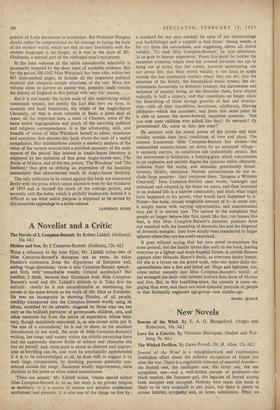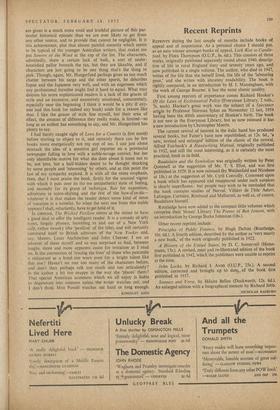New Novels
The Wicked Pavilion. By Dawn Powell. (W. H. Allen, 12s. 6d.)
Sowers of the Wind is a straightforward and rumbustious Australian effort about the military occupation of Japan just after the war. There is a regulation turn-out of assorted Aussies- the foolish one, the intelligent one, the bitter one, the un- scrupulous one—and a well-drilled parade of problems—the black market, the Japanese girl, the legacies of hatred among both occupier and occupied. Nobody who reads this book is likely to be very surprised at any point, but there is plenty to arouse interest, sympathy and, at times, admiration. What we
are given is a much more vivid and truthful picture of this par- ticular historical episode than we are ever likely to get from any other source, and to provide that cannot be negligible. It is this achievement, plus that almost painful sincerity which seems to be typical of the younger Australian writers, that makes me put Sowers of the Wind at the top of the list. The characters, admittedly, show a certain lack of bulk, a sort of under- nourished pallor beneath the tan, but they are likeable, and if characters are just going to be one thing that's the thing to pick. Though, again, Mr. Hungerford perhaps gives us too much chatter between his sarge and the other sports, he de'scribes Japan and the Japanese very well, and with an eagerness which any professional traveller might find it hard to equal. What may distress his more sophisticated readers is a lack of the graces of style and an excessive, and excessively emotional, commentary, especially near the beginning. 1 think it would be a pity if any- one laid this book (or indeed any book) aside for a reason like that. I like the graces of style fine myself, but their area of effect, the amount of difference they really make, is limited—so long as an author has something to say, and Mr. Hungerford has plenty to say.
I had barely caught sight of Love for a Convict (a first novel) before starting to object to it, and certainly there can be few books more energetically not my cup of tea. I can just about stomach the idea of a sensitive girl reporter on a provincial newspaper falling in love with a noble-savage convict, but her only identifiable motive for what she does about it turns out to be, not love, but a half-hidden desire to be thought shocking by some people and 'interesting' by others, and at this point the last of my sympathy expired. It is with all the more emphasis, then, that I must praise the book, firstly for the unusual vigour with which it puts over its (to me antipathetic) state of feeling, and secondly for its grasp of technique, flair for exposition, adroitness in scene-shifting and the rest of the how-d'ye-do- whatever it is that makes the reader detect some kind of sense of vocation in a novelist. So when the next one from this stable appears I shall, reluctantly, have to get hold of it.
In contrast, The Wicked Pavilion seems at the outset to have a good deal to offer the intelligent reader. It is a comedy of arty types, largely phoney. bumbling in and out of a New York cafe, rather swanky (the 'pavilion' of the title), and will certainly commend itself to British admirers of the New Yorker and, say, Messrs. Louis Auchincloss and John Cheever. I am an admirer of these myself and so was surprised to find, between laughs, more and more apparent cause for irritation as I read on. Is the convention of 'tracing the lives' of those who patronise a restaurant or a hotel too worn even for a bright talent like this one? Haven't we met too many of the characters before, and don't they perhaps talk too much and too articulately? Is the author a bit too snappy in the way she 'places' them? That special American acuteness which we all enjoy is liable to degenerate into cuteness unless the writer watches out, and











































 Previous page
Previous page